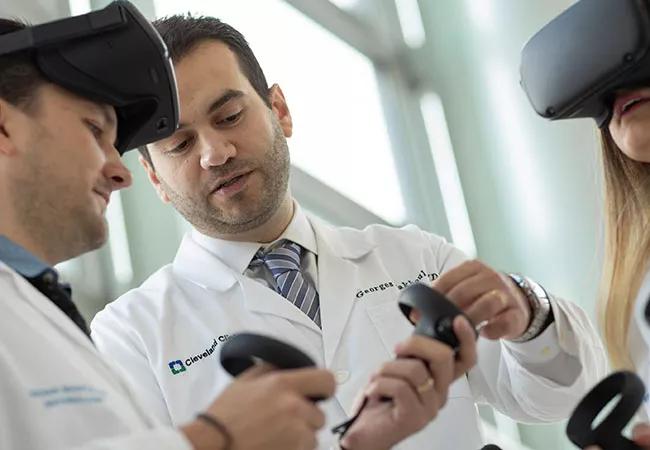Findings about the tool's utility were presented at the American Society of Nephology’s 2022 Annual Meeting

Image content: This image is available to view online.
View image online (https://assets.clevelandclinic.org/transform/d65a0457-8a18-4d03-9ed6-6099d4532768/650x450-Virtual-Reality-Nakhoul-jpg)
650×450-Virtual-Reality-Nakhoul
A new training tool that uses immersive virtual reality (VR) to support renal physiology education appears to improve short-term learning among the medical students utilizing it. The overall effectiveness of the VR tool still is being evaluated, but initial review shows it also to have been well-received by Cleveland Clinic residents.
Advertisement
Cleveland Clinic is a non-profit academic medical center. Advertising on our site helps support our mission. We do not endorse non-Cleveland Clinic products or services. Policy
In-depth results of an ongoing evaluation of the tool were presented at the American Society of Nephology’s 2022 Annual Meeting.
The development of the device, which integrates 3D printing and holographic computing to simulate mechanistic processes in nephron physiology and pathology, was led by Georges Nakhoul, MD, Director of Cleveland Clinic’s Center for Chronic Kidney Disease and Associate Director of the Nephrology Fellowship Program in the Glickman Urological & Kidney Institute, in partnership with Karl West, MS, Director of Medical Device Solutions in Cleveland Clinic’s Department of Biomedical Engineering, Lerner Research Institute. It was introduced to enhance renal physiology curricula more than two years ago.
Dr. Nakhoul is in the third year of assessing the utility of the VR technology to determine its helpfulness for residents undergoing the rigors of studying nephrology. In a study of 71 Cleveland Clinic residents, 41 were randomized to the VR group and 30 to a group that learned with a more traditional method. The VR session consisted of a 3D review of water/electrolyte transport and of the mechanism of action of diuretics.
Immediate testing on the material taught demonstrated higher scores among the VR group than among the group using traditional learning methods. Within six to 12 weeks later, 36 of the residents were tested again. This follow-up testing showed no significant difference in scores between the two groups. Further study is needed on whether the VR device assists in long-term learning, Dr. Nakhoul says, as fewer residents participated in that portion of the assessment.
Advertisement
“What we have learned is there is short-term improved learning using this tool and it has had a very good reception from the residents,” he says. Feedback obtained through focus groups from the residents who used the VR technology was overwhelmingly positive. They found it to be a helpful and engaging adjunct to their education.
Dr. Nakhoul says the technology is already integrated into the curriculum. The goal is to expand its use by offering more modules when funding allows.
Advertisement
Advertisement
Maintaining connections leads to referrals, recruitment and more
A commitment to sharing expertise has fostered a global exchange of ideas
Continuous Improvement model makes success repeatable
A century-old medical tradition inspired the weekly complex-case reviews in Rheumatology
Medical students will complete five weeks of clinical training
The program provides an inside look and hands-on experience for high school students interested in nursing
Join us in New York City Dec. 5-6
Program helps participants experience nursing through hands-on exploration